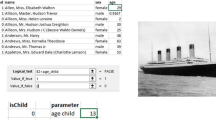Abstract
We examine teachers’ classroom activities with the spreadsheet, focusing especially on episodes marked by improvisation and uncertainty. The framework is based on Saxe’s cultural approach to cognitive development. The study considers two teachers, one positively disposed towards classroom use of technology, and the other not, both of them experienced and in a context in which spreadsheet use was compulsory: a new curriculum in France for upper secondary non-scientific classes. The paper presents and contrasts the two teachers in view of Saxe’s parameters, and analyzes their activity in two similar lessons. Goals emerging in these lessons show how teachers deal with instrumented techniques and the milieu under the influence of cultural representations. The conclusion examines the contribution that the approach and the findings can bring to understanding technology integration in other contexts, especially teacher education.





Similar content being viewed by others
Notes
Chevallard (2006) usefully presented this idea again in an article written in English.
Mrs PSCEP is “sceptical” about the educational use of technology and Mrs PEX is “experienced” in this use.
References
Abboud-Blanchard, M., & Lagrange, J. B. (2006). Uses of ICT by pre-service teachers: towards a professional instrumentation. The International Journal for Technology in Mathematics Education, 13(4), 183–191.
Ainley, J., Bills, L., & Wilson, K. (2005). Designing spreadsheet-based tasks for purposeful algebra. International Journal of Computers for Mathematical Learning, 10(3), 191–215. doi:10.1007/s10758-005-8420-9.
Artigue, M. (2002). Learning mathematics in a CAS environment: The genesis of a reflection about instrumentation and the dialectics between technical and conceptual work. International Journal of Computers for Mathematical Learning, 7, 245–274. doi:10.1023/A:1022103903080.
BOEN (2000). Classe de Première mathématiques-informatique série littéraire. Bulletin Officiel du Ministère de l’Education Nationale HS N°7 du 31 août 2000.
Brousseau, G. (1997). Theory of didactic situations in mathematics. Dordrecht: Kluwer Academic Publishers.
Chevallard, Y. (1999). L’analyse des pratiques enseignantes en théorie anthropologique du didactique. Recherches en Didactique des Mathématiques, 19, 221–266.
Chevallard, Y. (2006). Steps towards a new epistemology in mathematics education. In M. Bosch (Ed.), Proceedings of the Fourth Congress of the European Society for Research in Mathematics Education. FUNDEMI IQS–Universitat Ramon Llull.
Emprin, F. (2007). Formation initiale et continue pour l’enseignement des mathématiques avec les TICE: cadre d’analyse des formations et ingénierie didactique. Thèse de Doctorat, Université Paris 7.
Eurydice (2004). Key data on information and communication technology in schools in Europe?. Edition Brussels: Eurydice.
Haspekian, M. (2005). An “instrumental approach” to study the integration of a computer tool into mathematics teaching: the case of spreadsheets. International Journal of Computers for Mathematical Learning, 10(2), 109–141. doi:10.1007/s10758-005-0395-z.
Hennessy, S., Ruthven, K., & Brindley, S. (2005). Teacher perspectives on integrating ICT into subject teaching: commitment, constraints, caution and change. Journal of Curriculum Studies, 37(2), 155–192. doi:10.1080/0022027032000276961.
Hersant, M., & Perrin-Glorian, M. J. (2005). Characterization of an ordinary teaching practice with the help of the theory of didactic situations. Educational Studies in Mathematics, 59, 113–151. doi:10.1007/s10649-005-2183-z.
Laborde, C., & Perrin-Glorian, M.-J. (2005). Introduction teaching situations as object of research: empirical studies within theoretical perspectives. Educational Studies in Mathematics, 59, 1–12. doi:10.1007/s10649-005-5761-1.
Lagrange, J.-B. (2000). L’intégration d’instruments informatiques dans l’enseignement: une approche par les techniques. Educational Studies in Mathematics, 43, 1–30. doi:10.1023/A:1012086721534.
Misset, L. (2001). Déclic, Mathématiques Informatique Première L. Paris: Hachette Education.
Monaghan, J. (2004). Teachers’ activities in technology-based mathematics lessons. International Journal of Computers for Mathematical Learning, 9(3), 327–357. doi:10.1007/s10758-004-3467-6.
Ozdemir Erdogan, E. (2006). Pratiques d’enseignants de mathématiques en environnement technologique: L’intégration du tableur dans l’enseignement des suites en Première Littéraire. Thèse de Doctorat. Université Paris7.
Robert, A., & Rogalski, J. (2002). Le système complexe et cohérent des pratiques des enseignants de mathématiques: une double approche. Revue canadienne de l’enseignement des sciences, des mathématiques et de la technologie, 2(4), 505–528.
Robert, A., & Rogalski, J. (2005). A cross-analysis of the mathematics teacher’s activity. An example in a French 10th-grade class. Educational Studies in Mathematics, 59, 269–298. doi:10.1007/s10649-005-5890-6.
Ruthven, K., & Hennessy, S. (2002). A practitioner model of the use of computer-based tools and resources to support mathematics teaching and learning. Educational Studies in Mathematics, 49, 47–88. doi:10.1023/A:1016052130572.
Saxe, G. B. (1991). Culture and cognitive development: studies in mathematical understanding. Hillsdale NJ: Laurence Erlbaum Associates.
Acknowledgments
We thank the teachers who kindly accepted to be observed and the anonymous referees whose suggestions and critical remarks greatly helped to improve this article.
Author information
Authors and Affiliations
Corresponding author
Rights and permissions
About this article
Cite this article
Lagrange, JB., Ozdemir Erdogan, E. Teachers’ emergent goals in spreadsheet-based lessons: analyzing the complexity of technology integration. Educ Stud Math 71, 65–84 (2009). https://doi.org/10.1007/s10649-008-9160-2
Received:
Accepted:
Published:
Issue Date:
DOI: https://doi.org/10.1007/s10649-008-9160-2




